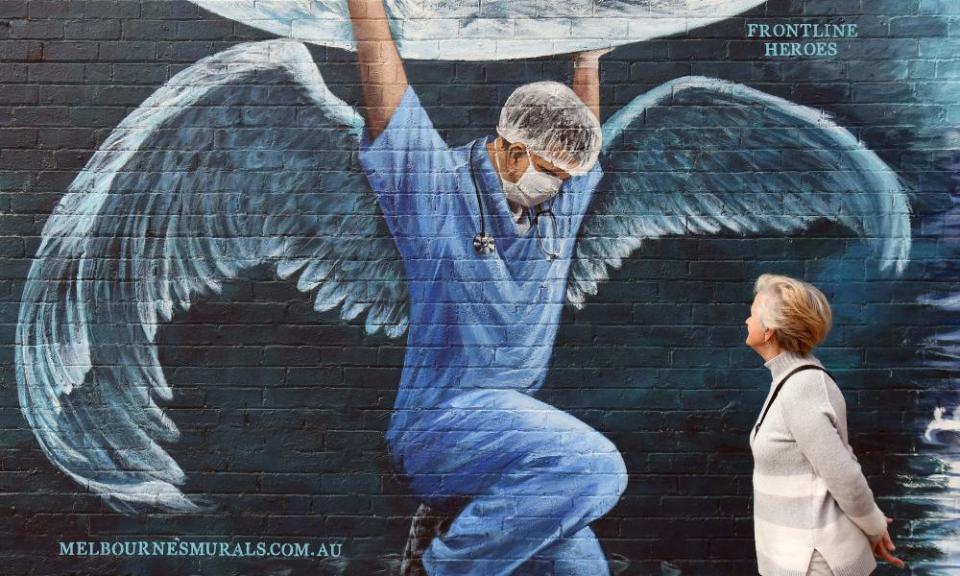The suggestion Covid deniers should stay out of public hospitals is appalling

I am responsible for the Covid zone in a major Melbourne emergency department.
To be a patient in here, you must be suffering from Covid-19.
In the middle of our third wave of the pandemic, this Covid zone is growing, as more and more patients fill the beds. They span the age spectrum from teenagers to the elderly, and the severity of their illness ranges from the mild (who will be able to be monitored at home) through to those whose life is in jeopardy, for whom intensive care must be considered.
After completing my shift and handing over to a senior colleague, I often reflect on the day, and carry home a heavy heart. Some of my patients are highly likely to deteriorate and may not survive. They remind me of members of my own family.
These patients come from all over Melbourne and their demographics could not be more diverse.
Across the state, many patients hospitalised with Covid have one thing in common, they are unvaccinated.
I hate the fact that so much of this death and disease is now preventable, and that a small but significant proportion of the community have not been vaccinated for reasons ranging from fear and complacency through to misguided refusal.
I have spent much of 2021 advocating for urgent, confident vaccination to anyone who would care to listen.
It comforted me to remember that while professional detachment is an essential part of being a good doctor, compassion and humanity are just as important. If you’re emotionally overwrought, your ability to make medical decisions is impaired, and the patient’s interests are jeopardised. By the same token, if you coldly follow some treatment algorithm without considering the human dignity of the person in front of you, you will never be the healer you aspire to be.
On Thursday, I was made aware of comments by the president of the Australian Medical Association’s Victoria branch. Reportedly, in discussing the enormous strain the pandemic is placing on medical resources, he suggests that those who deny the existence of Covid-19 “should update their advance care directives and inform their relatives that they do not wish to receive care in the public health system if diagnosed with the virus”. While noting that the unvaccinated would receive high-quality care in the state’s hospitals, McRae challenged Covid-deniers to commit to their beliefs and say “‘If I am diagnosed with this disease caused by a virus that I don’t believe exists, I will not disturb the public hospital system, and I’ll let nature run its course’.”
If the quote is faithfully conveyed, then it is in my view appalling, unethical, and an insult to the medical profession.
I think I speak for almost every doctor when I say care is provided on the basis of medical need, and the key principles of beneficence (doing all good for the patient) and non-maleficence (doing no harm) should always be applied.
However passionately I disagree with a patient’s views or actions – in this pandemic or any other context – I will never dispute their entitlement to public care on that basis. To do so would be reckless and undermine the confidence and trust placed in doctors by the community. It is no different to treating lung cancer or emphysema – smoking is only considered as a means to assess risk, not as a reason to judge their worthiness for public treatment.
This pandemic is presenting enormous challenges to our health system as we struggle to fight fatigue and resource constraints in the face of incredible demand. That’s why we always prefer prevention over cure.
But the decisions about treatment for Covid-19 (or any other illness, for that matter) will be based on offering the best available options for those who are most likely to benefit, and to avoid treatments where the risk of harm heavily outweighs the benefits.
Medical treatment should never be determined by populism but by evidence, and in a non-judgmental, compassionate manner. The Victorian community, who have already been through so much over the past 20 months, deserve better.
• Dr Stephen Parnis is an emergency physician and was the president of AMA Victoria from 2012 to 2014, and vice-president of the federal Australian Medical Association from 2014 to 2016

 Yahoo Finance
Yahoo Finance 